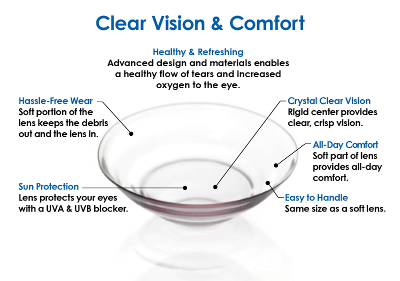Specialty contact lenses
Specialty contact lenses
There are many patients out there who desire contact lens wear but are not well-served by most of the standard options available. In addition, there is a large population that require a contact lens option because their vision with spectacles is so poor. At Mansfield Vision Center, we are proud to offer cutting-edge technology to better serve this population.
Specialty contact lenses offer new options to two different patient types: the over-40 patients with astigmatism who are not interested in monovision (one eye distance, one eye reading) or readers over their contact lenses, and patients with “irregular” corneas. This latter group is composed of those with keratoconus, post-surgical conditions (commonly post-RK), traumatic injury to the cornea, and congenital corneal issues. They often have very high astigmatism that cannot be properly corrected by glasses.
Irregular corneas are best diagnosed with corneal topography. A topographer is a device that provides a color-coded map of the corneal surface, which helps our doctors to both recommend the proper lens option for patients as well as obtain the proper fit. We are proud to offer that technology here.
SynergEyes Lenses
(Duette HD, Duette Multifocal,
Duette Progressive, and UltraHealth)
All of the SynergEyes lenses are “hybrids” – the central portion of the lens is a rigid gas permeable material (often referred to as “hard”) with a soft-material skirt surrounding it. The soft skirt serves two very important functions – it aids in lens stability, and greatly improves comfort versus traditional gas permeable lenses. A common complaint with traditional rigid gas permeable (RGP) is lens awareness/poor comfort; the vision is usually outstanding, especially for patients with astigmatism. Quite often patients with astigmatism will achieve equal or better vision with RGPs versus glasses but have to give them up because they cannot tolerate how they feel. With hybrids, we can now achieve “hard lens vision” with very near “soft lens comfort.”
The Duette HD is a very good option for patients with high astigmatism for that very reason. For those over 40 that require additional help for reading (presbyopes), the standard options still remain – they could put readers on over the lenses, or try monovision. The Duette Multifocal and Progressive are options for presbyopes with a significant astigmatism. Remember, with standard soft lenses these folks do not have many good bifocal options. They can get toric lenses that correct the astigmatism, but are limited to readers over the contact lenses, monovision, or one of the few toric/bifocals. With the hybrid, we can both correct the astigmatism (as long as all of it is on the cornea, which is the usual case) and offer the bifocal option.
The UltraHealth is for irregular corneas – both prolate (very steep, like in keratoconus) and oblate (very flat, like in post-RK patients). Again, many if not most of these patients require rigid-lens correction for optimal vision – their vision is almost always better with that option versus eyeglasses. Traditionally we would fit these patients in specially-designed standard RGP lenses – and we still can do that – but we may run into stability and comfort issues due to the cornea’s atypical shape.
All of the SynergEyes lenses are designed to be replaced every six months. For irregular corneas, a specialty lens is usually considered a medical necessity because of the improvement over spectacle acuity, and is usually covered under either vision or medical insurance.
ZenLens – a scleral contact lens
The newest contact lens technology is scleral lenses. At Mansfield Vision Center, we prefer the ZenLens because we believe it to be the best scleral lens available.
Scleral lenses are exclusively for patients with medically indicated conditions causing an irregular corneal shape. They are rigid lenses that are slightly larger than traditional soft lenses, and overlap the cornea onto the sclera. They are almost twice as large as traditional RGP lenses.
The idea with a scleral lens is to distribute the weight of the lens off of the cornea (which is much more sensitive) and onto the sclera. The optics portion of the lens “vaults” over the cornea, meaning it does not come into contact with it. Properly fit, this allows for both outstanding comfort and vision far superior to glasses in patients with irregular corneas. Patients with keratoconus who cannot tolerate rigid lenses are great candidates for sclerals.


Scleral lenses are replaced every one to two years. Like the SynergEyes lenses, sclerals are considered a medical necessity under most insurance plans because of the improvement in vision versus spectacles.
If you have ever been told you cannot wear contacts because “you have too much astigmatism,” or if you are frustrated with your vision with eyeglasses or your refractive surgery result, specialty contact lenses may very well be a new option for you. Come see the doctors at Mansfield Vision Center to see if you are a candidate for this newest technology!


